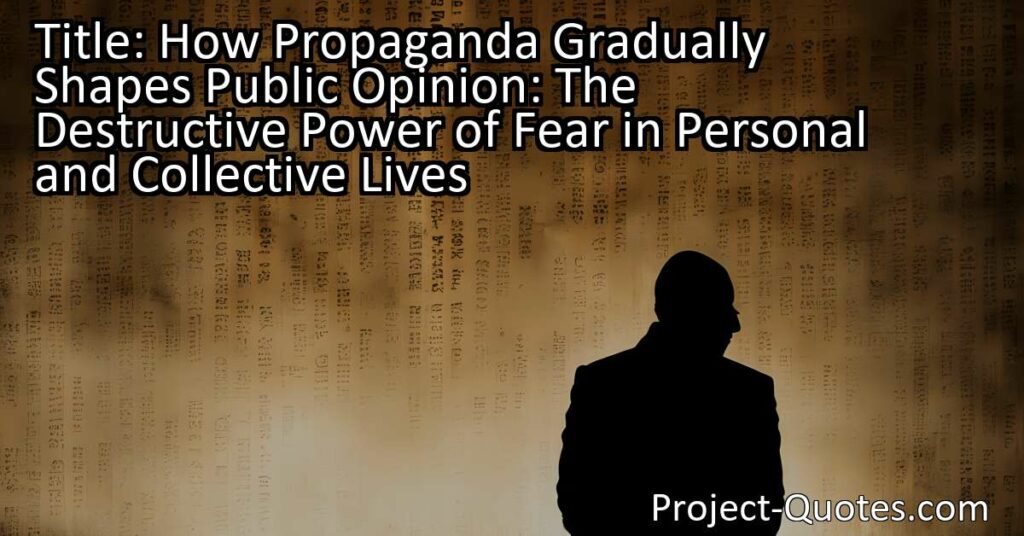Fear is, I believe, a most effective tool in destroying the soul of an individual – and the soul of a people.
Anwar Sadat
How Propaganda Gradually Shapes Public Opinion: The Destructive Power of Fear in Personal and Collective Lives Discover the damaging impact of fear and propaganda in shaping public opinion. From its paralyzing effects on individuals to its divisive consequences on society, explore how recognizing and confronting fear can lead to personal growth and a more united community. Learn how to dismantle fear’s grip and nurture resilience in both personal and collective lives.
Table of Contents
Meaning of Quote – Fear is, I believe, a most effective tool in destroying the soul of an individual – and the soul of a people.
The Destructive Power of Fear in Personal and Collective Lives
Introduction :
Fear, as aptly stated by the renowned Egyptian leader Anwar Sadat, has the potential to wreak havoc on both individual souls and entire communities. In this article, we delve into the profound statement made by Sadat, exploring various aspects of fear’s influence on the human condition and its devastating consequences.
Understanding the Nature of Fear :
Fear is a primal emotion that arises from the anticipation or perception of danger or harm. It is a natural response deeply ingrained within our evolutionary history, designed to protect us from threats. While fear is initially meant to be a survival mechanism, it can quickly turn into an instrument of destruction, eroding the soul of an individual and an entire people. This article will examine the ways in which fear can cripple personal growth, foster negativity, and undermine societal harmony.
Effects of Fear on the Individual :
In an individual’s life, fear can be a paralyzing force, hindering personal development and preventing one from realizing their full potential. Deep-seated fears can arise from traumatic experiences, social pressures, or fear of the unknown. These fears tend to take root in the mind, leading to self-doubt, anxiety, and a negative self-image.
When fear becomes pervasive, individuals often find themselves trapped in a cycle of avoidance and stagnation, fearing failure and rejection. This not only impedes their personal growth but also limits their ability to take risks, try new experiences, and embrace opportunities that could lead to success and fulfillment.
Fear’s Consequence in Society :
Beyond its impact on individuals, fear’s destructive power extends to society as a whole. When fear infiltrates society, it becomes a potent tool in the hands of manipulative leaders, who prey on people’s insecurities and anxieties for their personal or political gain. An atmosphere of fear can be created by emphasizing differences among racial, ethnic, or religious groups, fostering a divisive “us vs. them” mentality.
In such circumstances, fear-driven narratives and propaganda gradually shape public opinion and collective behavior. Fear instills distrust, fuels prejudice, and erodes the bonds that hold diverse communities together. As people retreat into their isolated cocoons of fear, society loses the valuable contributions of cooperation, empathy, and compassion that foster unity and progress.
History stands as a reminder of how collective fear has been weaponized to perpetrate oppression, genocide, and war. From the horrors of the Holocaust to the Rwandan Genocide, fear has been exploited to dehumanize entire populations, justifying acts of extreme violence. Many atrocities throughout history have been fueled by the insecurities and irrational fears of those in power.
Overcoming Fear and Rebuilding the Soul :
While fear has the potential to cause immense damage, it is crucial to recognize that the soul of an individual and a nation can be resilient. Overcoming fear requires self-reflection, self-acceptance, and a willingness to confront our fears head-on. By acknowledging our fears, we take the first steps toward dismantling their power over us.
On a collective level, promoting empathy, tolerance, and inclusivity can counter the effects of fear. It is essential to foster open dialogue, encourage understanding, and challenge divisive narratives that aim to exploit fear. By recognizing the common humanity in each individual, societies can rebuild trust and work towards creating a harmonious coexistence.
Conclusion :
Anwar Sadat’s powerful statement highlights the destructive potential of fear on both individuals and societies. By understanding its mechanisms and effects, we can strive to dismantle fear’s grip on our lives, enabling personal growth, fostering unity, and nurturing the resilience needed to thrive as individuals and communities.
I hope this quote inspired image brings you hope and peace. Share it with someone who needs it today!


